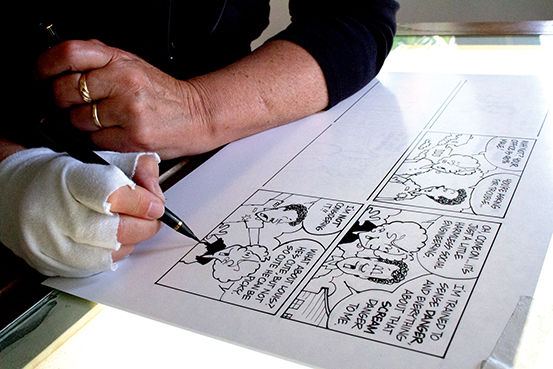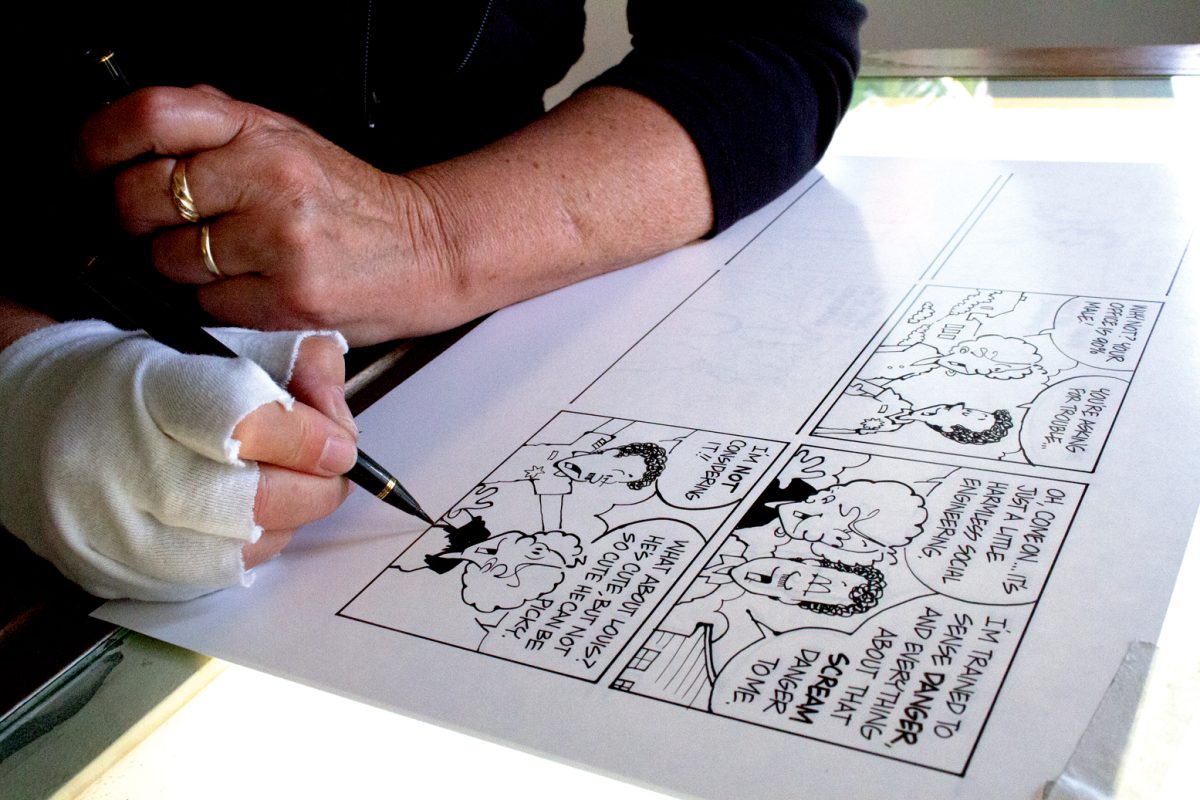Story by Sarabeth Oppliger
Photos by Matt Phillips
The scent of freshly brewed coffee swirls through the air of a cozy Eugene home as Jan Eliot walks into her small studio. The grey Monday morning light streams through the many windows that look out over a garden of spring flowers. Eliot takes a seat at the desk against the far wall, mug in hand. She thumbs through a stack of paper, carefully selects a sheet, and places it in front of her. The steaming cup of coffee, lingering quiet of the morning, and crinkling pages of the paper may seem like the start to any ordinary day, but Eliot doesn’t just read the morning comics. She creates them.
Born in San Jose, California, Eliot moved to Eugene in 1975 to study English and women’s studies at the University of Oregon. Throughout college and in the years following graduation, Eliot, best known as the creator of comic strip Stone Soup, always appreciated the effect of a good laugh.
“I had a fantasy to be a stand-up comic, but I didn’t have the guts,” she says.
Eliot’s self-identified short attention span along with being a divorced mother of two prevented her from devoting much time to any specific creative outlet. Then in 1979, a close friend suggested Eliot try cartooning. Intrigued by the idea, she bought a handful of how-to cartooning manuals from Eugene-based Smith Family Bookstore. Following the instructions, she started experimenting with characters and storylines.
Eliot’s first comic, Patience and Sarah, detailed the lives of a single mother and her daughter as based on the happenings of Eliot’s own life. The newly minted cartoonist found the medium cathartic, allowing her characters to express thoughts and frustrations she wasn’t able to. Her work’s serious undertones of single parenting and strained relationships strayed from the traditional Sunday funnies and, early on, were often criticized by publishers.
“Initially I was told they ‘didn’t need another woman’ on the comics page,” Eliot says. “Then I was told that a comic about single women was too depressing.”
But she sketched on despite the challenging feedback. To develop her own personal style, Eliot studied the work of other cartoonists. In the process, she fell in love with the art form. Her day job in graphic design and advertising permitted a bit of artistic freedom when drawing up visuals for projects, but nothing compared to making comic strips.
“It was always someone else’s work, always someone else’s ideas,” Eliot says of her former career. “Cartooning is all mine.”
Patience and Sarah just hinted at Eliot’s work to come. Her next comic, Sister City, introduced her two primary characters, Val and Joan. In 1990, Eugene newspaper, the Register-Guard, began publishing Sister City weekly. Eliot, however, was determined to get her strip placed in newspapers across the country and so continued to submit work samples to syndicates.
Her perseverance paid off in 1995 when Universal Press Syndicate picked up Sister City, which was renamed Stone Soup. In the 17 years since, Eliot’s work has appeared in more than 200 newspapers including publications in Europe, the Middle East, and Asia. Eliot says approximately 250 comic strips are syndicated in the United States, but only ten are created by women.
“You can’t wear your heart on your sleeve,” she says of the process leading up to syndication. “People are going to tell you that you aren’t good enough or they don’t get you or you’re too late. You just adjust and keep going.”
Every week, Eliot takes on the daunting task of creating seven new comic strips. Her job as a cartoonist is full time, but very rarely does Eliot scramble for new plots. Her daughters, who inspired the personalities of Stone Soup’s two teenage girls, have long since moved out to start their own families, but Eliot, who remarried in 1988, clearly remembers her experiences as a single mother. She draws from a bank of personal memories when creating new content for her strip, focusing on basic life challenges like suffering through the humiliating can’t-believe-that-just-happened-to-me moments of being a teenager, or having too little time and money as a parent. Eliot also draws inspiration from her friends and their families, always remembering to be cautious and courteous in using their personal stories for her comics. She recalls a particular instance involving her friend’s 16-year-old daughter and a suitcase full of sopping wet laundry.
“She put off doing her laundry and never let it dry so she just piled it into her suitcase,” Eliot says. “It weighed a ton and she ended up having to put her clothes in three or four garbage bags to get them on the plane. Of course it’s a great story, but she would have been so embarrassed if I’d written about it then.” Eliot did use the story a few years later, after she asked for permission.
She keeps her daily editing process personal; her husband is the first to review each new comic. Eliot uses his facial expressions as a simple rating system that immediately shows her the comics that are universally funny and the comics that may be more humorous for a female audience.
“Whoever reads your stuff, it’s important that they have your sense of humor,” she says.
Once her editor approves the day’s comic, Eliot’s work moves quickly. She bends over her light table to ink the paper while she rocks out to Jason Mraz and Pink Martini or listens to Rachel Maddow. When the outline is complete, Eliot scans it into her computer where she uses Photoshop to add color before sending it off to her publisher.
Seeing Stone Soup publish reminds Eliot of just how lucky she is to be doing what she does. She’s grateful to have landed her dream job, one that allows her to work from home and spend time with her family. Despite the international success of her career, Eliot never resents the long hours she puts into making each new comic strip: “Getting syndicated is like trying to win the lottery, but I have a love of cartooning. I really didn’t want to do anything else.”









